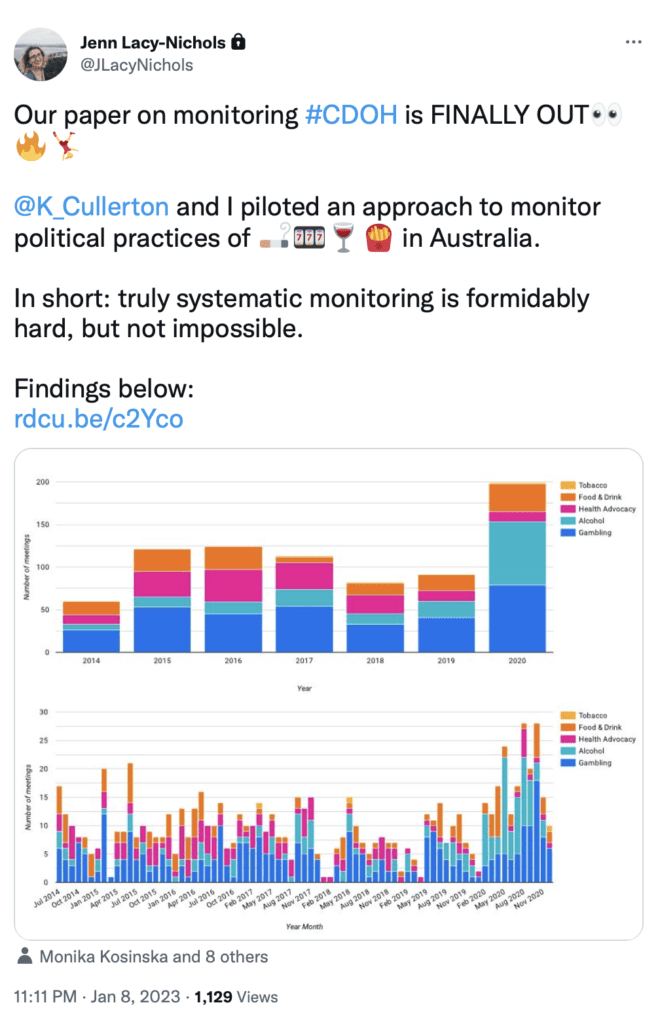A proposal for systematic monitoring of the commercial determinants of health: a pilot study assessing the feasibility of monitoring lobbying and political donations in Australia
Research article
Abstract
Background
The commercial determinants of health include a range of practices to promote business interests, often at the expense of public health. Corporate political practices, such as lobbying and campaign donations, are used to influence policy makers and foster a political and regulatory environment conducive to business interests. Despite recognition of their public health importance, thus far there are relatively few efforts to systematically monitor commercial political practices.
Methods
The researchers conducted a pilot study to explore the feasibility of systematically monitoring two political practices – lobbying and political contributions – for ‘harmful industries’ (alcohol, gambling, ultra-processed food and tobacco industries) in Australia.
Potential data sources were reviewed to compare data availability and detail.
Two publicly available datasets were selected for the pilot: ministerial diaries for New South Wales and annual donor filings from the Australian Electoral Commission.
Google Data Studio was used to analyse and visualise findings.
Results
The pilot study resulted in the creation of several interactive charts and dashboards that supported analysis and interrogation of the data. These charts helped to easily convey the volume of lobbying and political donations, as well as changes over time.
For example, the researchers found that between July 2014 and December 2020, NSW ministers had 20,607 meetings, of which 634 meetings were with health harmful industries.
- Gambling (n = 331),
- Alcohol (n = 158),
- Ultra-processed foods (n = 142), and
- Tobacco (n = 3).
And between 1998 and 2020, a total of $576,519,472 disclosed donations were made to political parties and other entities, of which $35,823,937 were from health harmful industries.
- Alcohol ($14,329,566),
- Gambling ($10,966,200),
- Ultra-processed foods ($6,144,679), and
- Tobacco ($4,383,492).
- The Liberal party was the largest recipient of harmful industry donations, with most coming from the alcohol industry followed by gambling, ultra-processed foods and tobacco.
Conclusions
Opportunities to develop a program to monitor commercial political practices face several challenges including access barriers arising from poor availability and detail of data, technical barriers arising from the format of data disclosures and coding challenges arising from the diverse nature of the commercial sector.
Despite these challenges, this pilot study demonstrates the potential to implement a monitoring program and to expand its scope to other commercial determinants of health.
Research highlights and meaning
Co-author Jennifer Lacy-Nichols published a tweet thread compiling some of the highlights of the pilot study:
- Truly systematic monitoring is formidably hard, but not impossible.
- Over time, trade associations have become more prominant than companies.
- This could be a way to protect company reputations. Future research could compare industries with cleaner vs dirtier reputations (e.g., tobacco, fossil fuels, arms, etc.).
- Harmful industries lobby many government portfolios. Health actors focus on health (and skip treasury entirely).
This pilot study provides many interesting insights into the strategies of influence used by commercial organisations. For example, while the gambling industry invested significantly more resources into lobbying than the other sectors examined, the alcohol industry prioritised providing political donations.
The tobacco industry made minimal representations to ministers in NSW, which is in line with the World Health Organization (WHO) Framework Convention on Tobacco Control (FCTC). However, the analysis has allowed the researchers to see that the tobacco sector is still providing political donations. The FCTC urges member states to either prohibit political donations from tobacco companies or require their full disclosure. This finding of continued political donations, albeit smaller amounts in later years, provides valuable data for tobacco control advocates who are monitoring compliance and the need for improvements within the FCTC.
Who is lobbied and when?
The data demonstrates the deputy premier was the minister receiving the most lobbying from harmful industries, whereas health advocates focussed their efforts on the health minister.
Future health advocacy efforts may want to consider targeting similar ministers to those targeted by harmful industries. A significant limitation of the ministerial diaries data is the absence of information about meetings with other public servants, such as senior advisors, who are alternative avenues to influence policy. Research in the EU, for example, highlights the important role of committee chairs and ‘rapporteurs’ in setting policy agendas.

